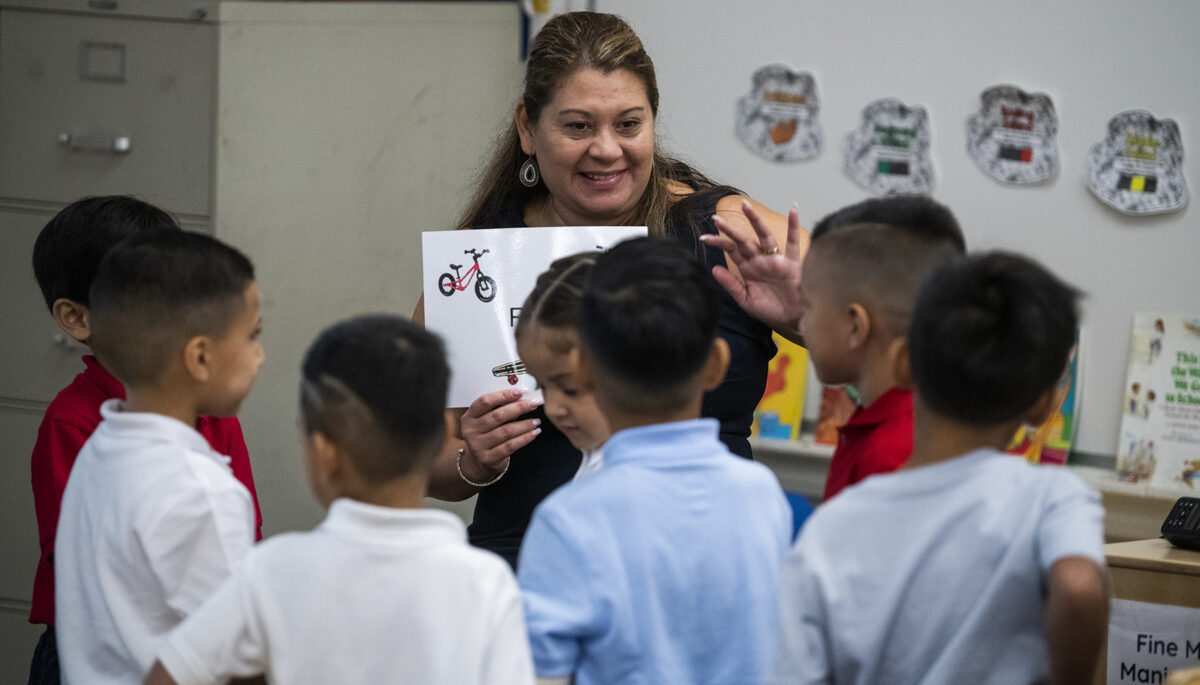Elisa Coburn, director of Un Mundo de Amigos, a bilingual Long Beach preschool, said the need for mental health support in her school is tremendous, especially when some families are experiencing everything from housing instability to domestic violence to immigration stress. “It ends up in our classrooms,” she said. “Our teachers are on the front lines managing that.”
It’s not a new issue. Alejandra Albarran Moses with the Long Beach Health Department says she’s been hearing caregivers raising alarms like this since 2020: childcare providers and preschool teachers were seeing an uptick in “challenging behaviors” – from tantrums to isolation to frequent crying – among the kids they serve. Some say these behaviors are now accelerating, placing additional stress on providers who are “often underpaid, often women of color,” Albarran Moses said.
In response, a new city program, funded by a $1.3 million state grant, is designed to address behavioral, emotional and mental health needs of kids from birth to age 5 – and to strengthen the workforce that cares for them. It’s part of the city’s push to prioritize early childhood providers, who play a key role in children’s learning and development. The program, which runs through June 2026, focuses on high-need communities, yet remains open to all city residents.
“It’s something that the community was really asking for,” said Albarran Moses, who oversees the Early Childhood Mental Health Program through the Health Department. “The sooner we can intervene, the sooner a child can get support.”
To get that support, parents, caregivers and educators can submit referrals for children experiencing emotional or behavioral challenges. This initiates a case consultation: program staff assess and observe the child, then collaborate on an individualized plan and link the child to resources, said Nirali Brahmbhatt, a clinical supervisor for the program.
If a preschool teacher refers a child with a speech delay to the program, “we’re connecting them to a speech pathologist,” Brahmbhatt said, as well as addressing underlying mental health needs that might have contributed to the delay.
“The heart of this work really is the consultation,” Albarran Moses said. She and her team aim to consult with 25 provider-child pairs, primarily in neighborhoods in North, West and Central Long Beach.
Without the capacity to consult with every provider in the city, the program aims to serve the community on a macro level by offering free workshops to caregivers and childcare providers on topics such as art therapy, child development and self-care.
The program also aims to attune parents, teachers and providers to what kids are saying without words. “Behavior is communication,” Brahmbhatt said. Toddlers exhibit a spectrum of emotions: “start paying attention to those nuances,” which can signal children’s needs, she said.
The program targets the city’s youngest children because “these are the foundational years,” Coburn said. Developmental scientists explain that the brain matures rapidly from birth to age 5, a period critical for physical, cognitive and social-emotional growth.
If intervention is necessary, it’s important to do it “during a point in their life where they are more able to absorb the intervention, the support, the tools for lifelong success,” Albarran Moses said.
Providers benefit from these interventions as well, Albarran Moses said. “If you have more tools for yourself and for the child and the family,” she said, “that will hopefully decrease burnout [and] increase interest in wanting to stay there.”
When stress enters the childcare setting, “everybody’s feeling it,” Coburn said – parents, teachers and children. But “when we can support the entire team, everybody wins.”
Community members can submit referrals now and can learn more about the program through the Health Department website or by contacting [email protected].

